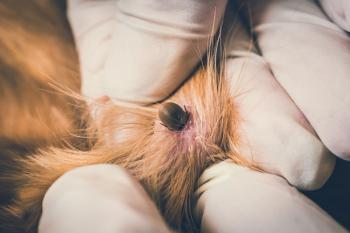
Add feline heartworms to your priority list
Heartworms can sneak up on cats-and you. Prepare yourself, then use a handout to start talking prevention with clients.
Feline heartworms have been squirming under the radar. They've tricked many veterinarians—maybe even you—into diagnosing asthma or allergic bronchitis in cats that exhibited respiratory problems. Research now shows that these cats were probably suffering from heartworm-associated respiratory disease (HARD).
Admit the problem
Most veterinarians—and clients—recognize that heartworms are dangerous to dogs. Feline heartworm disease is a less straightforward story. The main plot twist: It's the larvae that are causing the problem. "Cats get pulmonary disease because most of the larvae die before they reach adulthood," says Dr. Jane Brunt, past president of the American Association of Feline Practitioners. "And that mostly occurs in the lungs." The result is HARD, a relatively new diagnosis.
Getty Images
"It used to be that if veterinarians saw an acute death in a cat and found an adult heartworm, they thought the heartworm may have been the cause of death," says Dr. Brunt, who is now a spokesperson for KNOW Heartworms, a campaign to educate veterinarians and cat owners about feline heartworm disease. "But they also thought it was a phenomenon that didn't happen very often."
Today, researchers know differently. Cases of feline heartworm disease have been reported in all 50 states, according to the American Heartworm Society. "All veterinarians need to be aware of feline heartworm disease, even if they live in areas that aren't endemic," Dr. Brunt says. "More cats than ever are at risk."
Prevention is important—everywhere
So how do you help write a happy ending to the feline heartworm disease story? First, learn more about HARD and help your team members do the same. Remember, if you encounter cats that are coughing, making hairball noises, or seem to be asthmatic, you should consider them all to be highly suspect for having the disease. Then recommend year-round heartworm prevention for every cat you examine, whether it roams outside or stays inside and whether it lives in an arid or humid region. Finally, educate your clients about why their cats need to be on heartworm preventive—mosquitoes are spreading, more cats are traveling the country with their owners, and feline heartworm diagnoses are on the rise.
If you live in the mountains at 12,000 feet and haven't seen a mosquito in years, some of your clients may balk at the idea. But don't quit talking about HARD. The more they hear the message, the more it will sink in. "From a wellness and compliance picture, encouraging your clients to administer year-round parasite prevention is a very good start—not only for your clients' convenience, but also for their cats' overall health," Dr. Brunt says. "And that's all you really need to think about."
Newsletter
From exam room tips to practice management insights, get trusted veterinary news delivered straight to your inbox—subscribe to dvm360.




